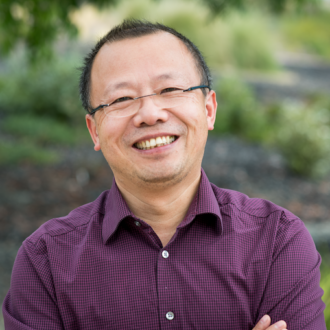Jian-Hua Mao
Geneticist Senior Scientist
Research Interests
A systems biology approach to identification of genetic networks controlling susceptibility to tumor development and progression induced by environmental exposure
Genetic susceptibility plays a role in many types of cancer. Identifying the genes involved in susceptibility to cancer may have potential utility in risk management, lead to greater understanding of the biological pathways involved in cancer development, and elucidate how environmental factors exert their effects in combination with genetic variants. One of the broad and long-term goals of my laboratory is to identify the combinations of genes and their functional polymorphisms that affect the susceptibility of individual human subjects to the effects of environmental exposure, such as thirdhand smoke and radiation. The detection and characterization of multiple low penetrance genetic variants that control many complex diseases is one of the major challenges of the future, but progress is hampered by formidable technical and conceptual difficulties. Mouse models offer many advantages for the study of the genetic basis of complex traits, including environmental exposure-induced cancers, because of our ability to control both the genetic and environmental components of risk. The goal is the understanding of all stages of multi-step carcinogenesis in the mouse, in particular the relationships between germ line predisposition and somatic genetic changes in tumors. The identification of human homologues of these predisposition genes and discovery of their roles in carcinogenesis will ultimately be important for the development of methods for prediction of risk, diagnosis, prevention and therapy for human cancers. We will use mouse population-based approach, such as Collaborative Cross system, to exploit the variation in susceptibility to environmental exposure-induced cancers and to identify the combinations of quantitative trait loci (QTLs) that control the radiation response. The power of classical mouse genetics will be complemented by new approaches involving haplotyping to refine the genomic locations of QTLs, together with sophisticated genetic analysis of the somatic events in environmental exposure-induced cancers using next generation sequencing technology. This comprehensive systems biology approach may identify specific genes or pathways that are differentially controlled between mouse strains, and contribute to variation in susceptibility to environmental exposure-induced carcinogenesis.
Develop new mouse models for human cancer
Sporadic tumors, which account for the majority of all human cancers, evolve as the result of a step-wise accumulation of genetic alterations resulting in uncontrolled cell proliferation and a lack of response to apoptotic cues. Such genetic alterations include point mutations, deletions, duplication/amplification, and translocations and these alterations can lead to the enhanced or decreased activity of the expressed protein. These alterations are referred to as ‘gain-of-function’ or ‘loss-of-function’ mutations, respectively. The affected genes are termed oncogenes or tumor suppressors, respectively. Within the last decade, the availability of a complete sequence-based map of the human genome, coupled with significant technological advances, has revolutionized the search for somatic alterations in tumor genomes. Within a given tumor type there are many infrequently mutated genes and a few frequently mutated genes, resulting in incredible genetic heterogeneity. The resulting catalogues of somatic alterations will point to candidate cancer genes, but requiring further validation to determine whether they have a causal role in tumorigenesis. The availability of gene targeting and transgenic technology in the mouse gives us unparalleled opportunities to test the functional significance of genetic changes in tumor development. Another one of the broad and long-term goals of my laboratory is to develop new mouse models for human cancer. These mouse models not only will increase our understanding of genetic aberration associated with cancer progression, but also will potentially help to identify personalized medicine for cancer patients, which may eventually contribute to a decrease in morbidity and mortality of cancer.
Recent Publications
Related News
A New Genetic Hallmark for Predicting Breast Cancer Outcomes
Biosciences researchers have used Collaborative Cross mice, a mouse model system designed to mimic the diversity of human populations, to identify a set of genetic factors that could help refine treatment approaches for a fast-growing form of breast cancer.
Two Scientists Join Ranks of AAAS Fellows
Two senior scientists in the Biosciences Area, Jian-Hua Mao and Trent Northen, are newly named Fellows of the American Association for the Advancement of Science (AAAS).
Toward a Genetic Understanding of Variability in Radiation Sensitivity
Injury to immune-system and blood-forming cells is a common side effect of radiation therapy, which more than half of all cancer patients receive as part of their treatment. Biosciences Area researchers and their collaborators used a genetically diverse mouse population to model individual differences in sensitivity to radiation exposure.




